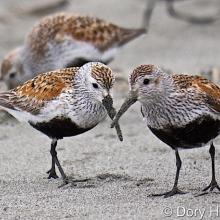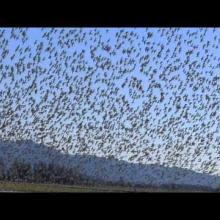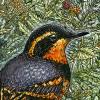

Join BirdNote tomorrow, November 30th!
Illustrator David Sibley and actor H. Jon Benjamin will face off in the bird illustration battle of the century during BirdNote's Year-end Celebration and Auction!
When birds like these Dunlin form flocks, each individual is less likely to be captured by a predator. Some shorebirds that forage with their heads down, like godwits, will flock with birds that forage with their heads up, like curlews. Still other birds work together — like American White Pelicans driving fish before them or auklets that surround schools of herring and herd them like a border collie does sheep.
Today's show brought to you by the Bobolink Foundation.
BirdNote®
Why Do Some Birds Flock?
Written by Dennis Paulson
This is BirdNote.
Why do some birds gather in flocks? And why do some even join forces with other species?
For pure, elemental reasons of course: to avoid predators and to find prey of their own.
When birds fly in a flock, each individual bird is less likely to be captured by a predator, like a falcon.
A single bird in a flock of 20 has only a 5 percent chance of being chased, whereas a bird alone is the only game in town. All that confusing movement makes it far more difficult for that falcon to concentrate on any one bird. And a flock of starlings — a murmuration — might even dive on a hawk, scaring it away. Imagine a whirling mass of thousands of birds, headed right for you!
With many birds together, there are more eyes looking in more directions, so birds spend more time feeding and less time looking around. And this is true across species as well. Some shorebirds that forage with their heads down, like godwits, will flock with birds that forage with their heads up*, like curlews.
Still other birds work together -- like American White Pelicans driving fish before them,
[American White Pelican calls, LNS#1988]
... or auklets that surround schools of herring and herd them like a border collie does sheep.
See photos and videos of all this on our website, BirdNote.org.
I’m Mary McCann.
Today’s show brought to you by the Bobolink Foundation.
###
Bird sounds provided by The Macaulay Library of Natural Sounds at the Cornell Lab of Ornithology, Ithaca, New York.
BirdNote’s theme music was composed and played by Nancy Rumbel and John Kessler.
LNS # 1988 recorded by Randolph Little.
Producer: John Kessler
Managing Producer: Jason Saul
Associate Producer: Ellen Blackstone
© 2018 Tune In to Nature.org January 2018/2021 / August 2023
Narrator: Mary McCann
ID# flock-03 flock-03-2021-1-12










